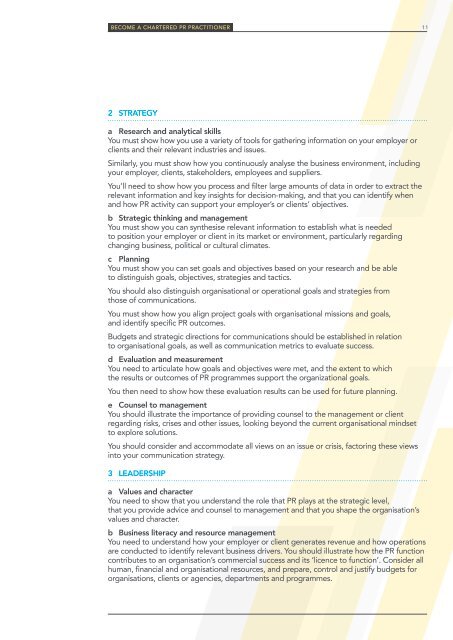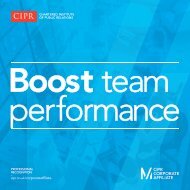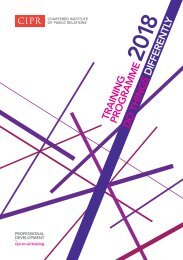Guide to Chartered 2018
You also want an ePaper? Increase the reach of your titles
YUMPU automatically turns print PDFs into web optimized ePapers that Google loves.
BECOME A CHARTERED PR PRACTITIONER 11<br />
2 STRATEGY<br />
a Research and analytical skills<br />
You must show how you use a variety of <strong>to</strong>ols for gathering information on your employer or<br />
clients and their relevant industries and issues.<br />
Similarly, you must show how you continuously analyse the business environment, including<br />
your employer, clients, stakeholders, employees and suppliers.<br />
You’ll need <strong>to</strong> show how you process and filter large amounts of data in order <strong>to</strong> extract the<br />
relevant information and key insights for decision-making, and that you can identify when<br />
and how PR activity can support your employer’s or clients’ objectives.<br />
b Strategic thinking and management<br />
You must show you can synthesise relevant information <strong>to</strong> establish what is needed<br />
<strong>to</strong> position your employer or client in its market or environment, particularly regarding<br />
changing business, political or cultural climates.<br />
c Planning<br />
You must show you can set goals and objectives based on your research and be able<br />
<strong>to</strong> distinguish goals, objectives, strategies and tactics.<br />
You should also distinguish organisational or operational goals and strategies from<br />
those of communications.<br />
You must show how you align project goals with organisational missions and goals,<br />
and identify specific PR outcomes.<br />
Budgets and strategic directions for communications should be established in relation<br />
<strong>to</strong> organisational goals, as well as communication metrics <strong>to</strong> evaluate success.<br />
d Evaluation and measurement<br />
You need <strong>to</strong> articulate how goals and objectives were met, and the extent <strong>to</strong> which<br />
the results or outcomes of PR programmes support the organizational goals.<br />
You then need <strong>to</strong> show how these evaluation results can be used for future planning.<br />
e Counsel <strong>to</strong> management<br />
You should illustrate the importance of providing counsel <strong>to</strong> the management or client<br />
regarding risks, crises and other issues, looking beyond the current organisational mindset<br />
<strong>to</strong> explore solutions.<br />
You should consider and accommodate all views on an issue or crisis, fac<strong>to</strong>ring these views<br />
in<strong>to</strong> your communication strategy.<br />
3 LEADERSHIP<br />
a Values and character<br />
You need <strong>to</strong> show that you understand the role that PR plays at the strategic level,<br />
that you provide advice and counsel <strong>to</strong> management and that you shape the organisation’s<br />
values and character.<br />
b Business literacy and resource management<br />
You need <strong>to</strong> understand how your employer or client generates revenue and how operations<br />
are conducted <strong>to</strong> identify relevant business drivers. You should illustrate how the PR function<br />
contributes <strong>to</strong> an organisation’s commercial success and its ‘licence <strong>to</strong> function’. Consider all<br />
human, financial and organisational resources, and prepare, control and justify budgets for<br />
organisations, clients or agencies, departments and programmes.









